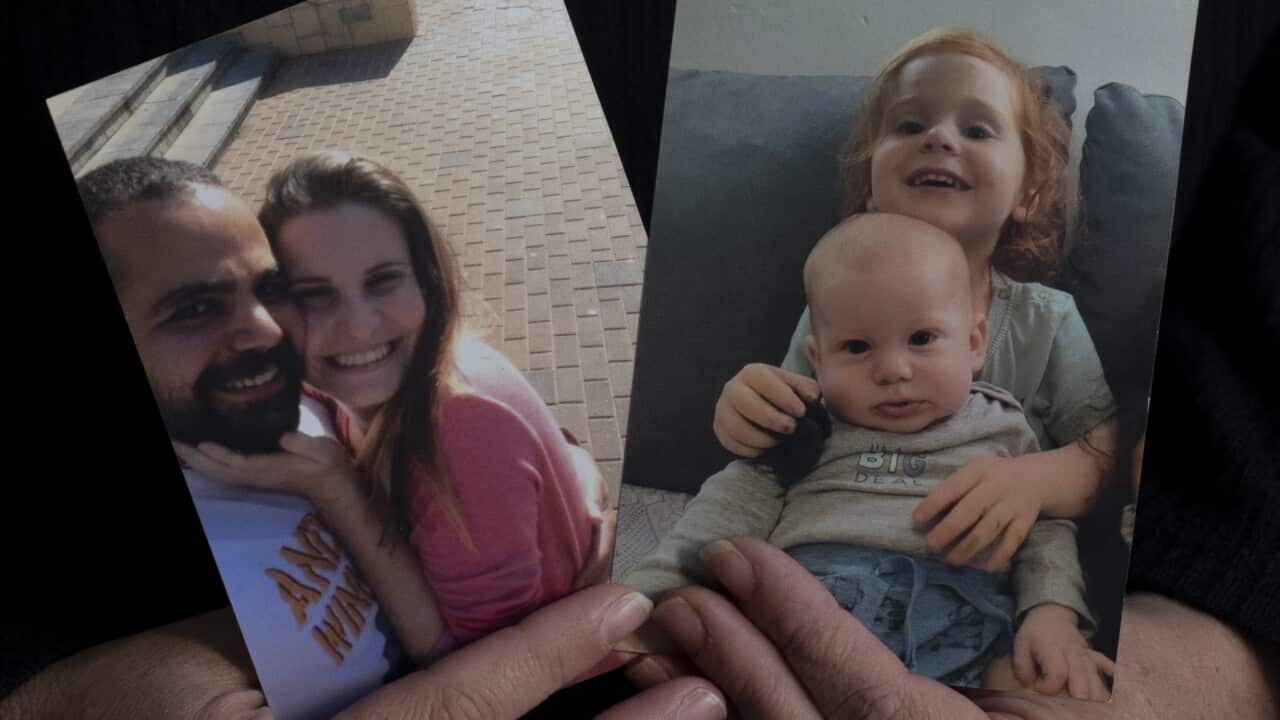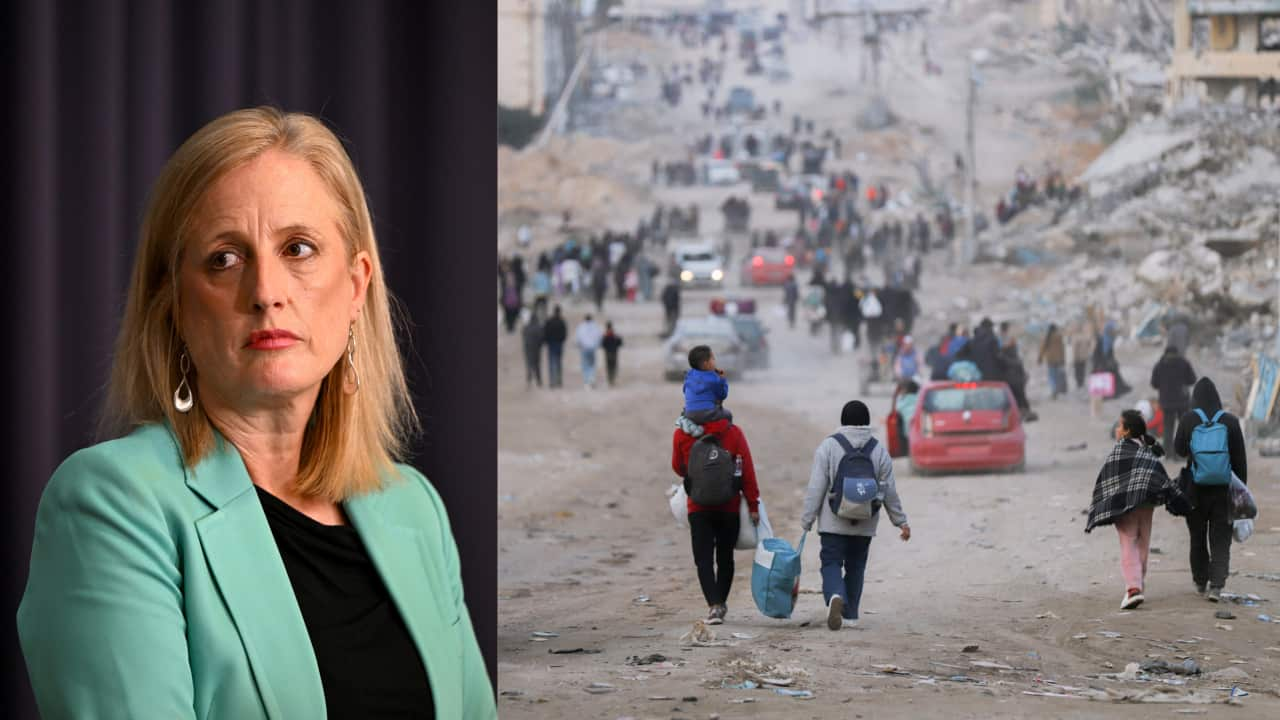Hamas handed over the bodies of Israeli infant Kfir Bibas and his four-year-old brother Ariel on Thursday, the two youngest captives taken by the group in their October 7 2023 attack and among the most potent symbols of the trauma inflicted that day.
Red Cross vehicles drove away from the handover site in the Gaza Strip with four black coffins that had been placed on a stage. Each of the caskets had a small picture of the hostages.
, along with that of a fourth hostage, Oded Lifschitz to Israel, under the Gaza ceasefire agreement reached last month with the backing of the United States and the mediation of Qatar and Egypt.
"Agony. Pain. There are no words. Our hearts — the hearts of an entire nation — lie in tatters," said Israel's President Isaac Herzog.
"On behalf of the State of Israel, I bow my head and ask for forgiveness. Forgiveness for not protecting you on that terrible day. Forgiveness for not bringing you home safely."
Prime Minister Benjamin Netanyahu said in a brief video statement that the transfer represented "a very difficult day for the state of Israel. An upsetting day, a day of grief."
Hundreds of people gathered in the winter cold ahead of the handover at Khan Younis in southern Gaza. Armed Hamas militants in black and camouflage uniforms toured the area.
One militant stood beside a poster of a man standing over coffins wrapped in Israeli flags. Instead of legs he had tree roots in the ground, suggesting the land belongs to Palestinians. The poster read "The Return of the War=The Return of your Prisoners in Coffins".
Kfir Bibas was nine months old when the Bibas family, including their father Yarden, was abducted at Kibbutz Nir Oz, one of a string of communities near Gaza that were overrun by Hamas-led attackers from Gaza on October 7.
Hamas said in November 2023 that the boys and their mother had been killed in an Israeli airstrike but their deaths were never confirmed by Israeli authorities and even at the last minute, some refused to accept they were dead.
"Shiri and the kids became a symbol," said Yiftach Cohen, a resident of Nir Oz, which lost around a quarter of its inhabitants, either killed or kidnapped, during the October 7 assault. "I still hope that they will be alive."
Yarden Bibas was returned in an earlier exchange of hostages for prisoners this month. But the family said this week their "journey is not over" until they received final confirmation of what happened to the boys and their mother.
"We wake up to a difficult morning for all of us. A morning that sharpens the cruelty of our enemies and the justice of our determined war against them until they are destroyed from the face of the earth," Israeli Finance Minister Bezalel Smotrich said in a post on X.
At the handover site, a large poster was hung up, depicting Netanyahu as a vampire standing over images of the four hostages and describing him as a "war criminal".
Following the handover, the remains were moved into coffins draped with the Israeli flag and an army rabbi presided over a short ceremony. They were then taken to Israel to the National Forensic Institute to be identified, a process that could take hours or even days.
Only after identification will there be a formal announcement of their deaths and a funeral.
The handover marks the first return of dead bodies during the and Israel is not expected to confirm their identities until full DNA checks have been completed.
Despite accusations on both sides of ceasefire breaches, the fragile agreement that took effect on 19 January has held up since the first in a series of exchanges of hostages in Gaza for Palestinian prisoners and detainees held by Israel.
Netanyahu has faced criticism from his far-right coalition allies for agreeing to the deal, which some in Israel feel rewards Hamas and leaves the militant group in place in Gaza.
But successive surveys have shown broad support among the public for the ceasefire, and thousands of Israelis have taken to the streets to demand the government stick to the deal until all the remaining hostages are returned.
Israel launched its war in the Gaza Strip after the Hamas-led attack that killed some 1,200 people, according to Israeli tallies, with 251 kidnapped. The Israeli military campaign has killed some 48,000 people, Palestinian health authorities say, and left densely populated Gaza largely in ruins.
Living hostages
Thursday's handover of bodies will be followed by the return of six living hostages on Saturday, in exchange for hundreds more Palestinians, expected to be women and minors detained by Israeli forces in Gaza during the war.
Under the ceasefire deal, Hamas agreed to release 33 hostages in exchange for nearly 2,000 Palestinian prisoners and detainees in the first phase of an agreement intended to pave the way toward ending the war in Gaza.
So far 19 Israeli hostages have been released, as well as five Thais who were returned in an unscheduled handover.
Negotiations for a second phase, expected to cover the return of around 60 remaining hostages, less than half of whom are believed to be alive, and a full withdrawal of Israeli troops from the Gaza Strip to allow an end to the war, are expected to begin in the coming days.
Prospects for an agreement remain uncertain, however, with both sides far apart on issues including the future governance of Gaza, which Israel has said cannot be run by either Hamas or the Western-backed Palestinian Authority.
The issue has also been clouded by US President Donald Trump's call for Palestinians to be resettled outside Gaza, a move critics say would amount to a war crime and ethnic cleansing, and for the enclave to be developed as a waterfront property under US control.



